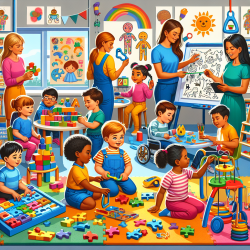Introduction
In the realm of child development, the role of fathers has often been overshadowed by the focus on maternal influences. However, recent research, particularly the study titled “At Least Somebody Sees You as a Hero”: Fatherhood Stress and Well-Being in Ghana, sheds light on the significant impact that paternal stress and well-being have on family dynamics and child outcomes. This blog post aims to guide practitioners in leveraging these insights to improve their practice and encourage further research into this crucial area.
The Research Findings
The study conducted in Ghana utilized a mixed-methods approach to assess the impact of parenting stress on fathers' overall well-being. The research revealed a strong negative correlation between paternal stress and well-being, indicating that higher levels of stress are associated with poorer well-being. This was quantified using the Aggravation in Parenting Scale (APS) and the Secure Flourishing Index (SFI).
Key stressors identified among Ghanaian fathers included:
- Financial Stressors: Employment instability, food insecurity, and the costs associated with education and healthcare.
- Social Stressors: Societal expectations and pressures related to fatherhood.
- Psychological Stressors: Mental health challenges, relationship dynamics, and coping mechanisms.
Despite these stressors, the research also highlighted a pervasive theme of pride and joy in parenting, suggesting that fatherhood, while challenging, is deeply rewarding.
Implications for Practitioners
For practitioners working with children and families, understanding the role of fathers in child development is crucial. The findings from this study can inform several practice improvements:
- Holistic Family Support: Programs should incorporate support for fathers, addressing financial, social, and psychological stressors.
- Mental Health Resources: Providing access to mental health services for fathers can mitigate stress and improve family dynamics.
- Community Engagement: Engaging community leaders to shift societal norms and reduce the stigma associated with seeking help.
Encouraging Further Research
The study underscores the need for more research into paternal roles in non-Western settings. Practitioners are encouraged to advocate for and participate in research that explores fatherhood's impact on child outcomes across diverse cultural contexts.
Conclusion
Understanding and supporting the role of fathers in child development can lead to improved outcomes for children and families. By addressing the stressors identified in the Ghanaian context, practitioners can enhance their practice and contribute to a more comprehensive understanding of family dynamics.
To read the original research paper, please follow this link: “At Least Somebody Sees You as a Hero”: Fatherhood Stress and Well-Being in Ghana.










